- Campaign
Communications « Facebook Prepares for
Election Day plus Technical Issues Affect Political
and Issue Ads
https://www.facebook.com/zuck/posts/10112270823363411
Mark Zuckerberg
September 3, 2020
The US elections are just two months away, and with Covid-19 affecting communities across the country, I'm concerned about the challenges people could face when voting. I'm also worried that with our nation so divided and election results potentially taking days or even weeks to be finalized, there could be an increased risk of civil unrest across the country.
This election is not going to be business as usual. We all have a responsibility to protect our democracy. That means helping people register and vote, clearing up confusion about how this election will work, and taking steps to reduce the chances of violence and unrest.
Facebook is already running the largest voting information campaign in American history -- with a goal of helping 4 million people to register and then vote. In just three days, we already drove almost 24 million clicks to voter registration websites. Priscilla and I have also personally donated $300 million to non-partisan organizations supporting states and local counties in strengthening our voting infrastructure.
Today, we're announcing additional steps we're taking at Facebook to encourage voting, connect people with authoritative information, and fight misinformation. These changes reflect what we've learned from our elections work over the past four years and the conversations we've had with voting rights experts and our civil rights auditors:
• We will put authoritative information from our Voting Information Center at the top of Facebook and Instagram almost every day until the election. This will include video tutorials on how to vote by mail, and information on deadlines for registering and voting in your state.
• We're going to block new political and issue ads during the final week of the campaign. It's important that campaigns can run get out the vote campaigns, and I generally believe the best antidote to bad speech is more speech, but in the final days of an election there may not be enough time to contest new claims. So in the week before the election, we won't accept new political or issue ads. Advertisers will be able to continue running ads they started running before the final week and adjust the targeting for those ads, but those ads will already be published transparently in our Ads Library so anyone, including fact-checkers and journalists, can scrutinize them.
• We're going to extend our work with election officials to remove misinformation about voting. We already committed to partnering with state election authorities to identify and remove false claims about polling conditions in the last 72 hours of the campaign, but given that this election will include large amounts of early voting, we're extending that period to begin now and continue through the election until we have a clear result. We've already consulted with state election officials on whether certain voting claims are accurate.
• We're reducing the risk of misinformation and harmful content going viral by limiting forwarding on Messenger. You'll still be able to share information about the election, but we'll limit the number of chats you can forward a message to at one time. We've already implemented this in WhatsApp during sensitive periods and have found it to be an effective method of preventing misinformation from spreading in many countries.
• We're expanding our voter suppression policies. We already remove explicit misrepresentations about how or when to vote that could cause someone to lose their opportunity to vote -- for example, saying things like "you can send in your mail ballot up to 3 days after election day", which is obviously not true. (In most states, mail-in ballots have to be *received* by election day, not just mailed, in order to be counted.) We're now expanding this policy to include implicit misrepresentations about voting too, like "I hear anybody with a driver's license gets a ballot this year", because it might mislead you about what you need to do to get a ballot, even if that wouldn't necessarily invalidate your vote by itself.
• We're putting in place rules against using threats related to Covid-19 to discourage voting. We will remove posts with claims that people will get Covid-19 if they take part in voting. We'll attach a link to authoritative information about Covid-19 to posts that might use the virus to discourage voting, and we're not going to allow this kind of content in ads. Given the unique circumstances of this election, it's especially important that people have accurate information about the many ways to vote safely, and that Covid-19 isn't used to scare people into not exercising their right to vote.
Since the pandemic means that many of us will be voting by mail, and since some states may still be counting valid ballots after election day, many experts are predicting that we may not have a final result on election night. It's important that we prepare for this possibility in advance and understand that there could be a period of intense claims and counter-claims as the final results are counted. This could be a very heated period, so we're preparing the following policies to help in the days and weeks after voting ends:
• We'll use the Voting Information Center to prepare people for the possibility that it may take a while to get official results. This information will help people understand that there is nothing illegitimate about not having a result on election night.
• We're partnering with Reuters and the National Election Pool to provide authoritative information about election results. We'll show this in the Voting Information Center so it's easily accessible, and we'll notify people proactively as results become available. Importantly, if any candidate or campaign tries to declare victory before the results are in, we'll add a label to their post educating that official results are not yet in and directing people to the official results.
• We will attach an informational label to content that seeks to delegitimize the outcome of the election or discuss the legitimacy of voting methods, for example, by claiming that lawful methods of voting will lead to fraud. This label will provide basic authoritative information about the integrity of the election and voting methods.
• We'll enforce our violence and harm policies more broadly by expanding our definition of high-risk people to include election officials in order to help prevent any attempts to pressure or harm them, especially while they're fulfilling their critical obligations to oversee the vote counting.
• We've already strengthened our enforcement against militias, conspiracy networks like QAnon, and other groups that could be used to organize violence or civil unrest in the period after the elections. We have already removed thousands of these groups and removed even more from being included in our recommendations and search results. We will continue to ramp up enforcement against these groups over the coming weeks.
It's important to recognize that there may be legitimate concerns about the electoral process over the coming months. We want to make sure people can speak up if they encounter problems at the polls or have been prevented from voting, but that doesn't extend to spreading misinformation. We'll enforce the policies I outlined above as well as all our existing policies around voter suppression and voting misinformation, but to ensure there are clear and consistent rules, we are not planning to make further changes to our election-related policies between now and the official declaration of the result.
In addition to all of this, four years ago we encountered a new threat: coordinated online efforts by foreign governments and individuals to interfere in our elections. This threat hasn't gone away. Just this week, we took down a network of 13 accounts and 2 pages that were trying to mislead Americans and amplify division. We've invested heavily in our security systems and now have some of the most sophisticated teams and systems in the world to prevent these attacks. We've removed more than 100 networks worldwide engaging in coordinated inauthentic behavior over the past couple of years, including ahead of major democratic elections. However, we're increasingly seeing attempts to undermine the legitimacy of our elections from within our own borders.
I believe our democracy is strong enough to withstand this challenge and deliver a free and fair election -- even if it takes time for every vote to be counted. We've voted during global pandemics before. We can do this. But it's going to take a concerted effort by all of us -- political parties and candidates, election authorities, the media and social networks, and ultimately voters as well -- to live up to our responsibilities. We all have a part to play in making sure that the democratic process works, and that every voter can make their voice heard where it matters most -- at the ballot box.
https://about.fb.com/news/2020/10/preparing-for-election-day/
October 7, 2020
By Guy Rosen, VP, Integrity
Preparing for Election Day
We’ve known for a long time that the 2020 election in the US would be unlike any other. We’ve been preparing for this election with a unique set of products and policies. As we head into the final stretch, we remain focused on two important goals:- Helping more Americans register and vote
- Protecting the integrity of the election by fighting foreign interference, misinformation and voter suppression
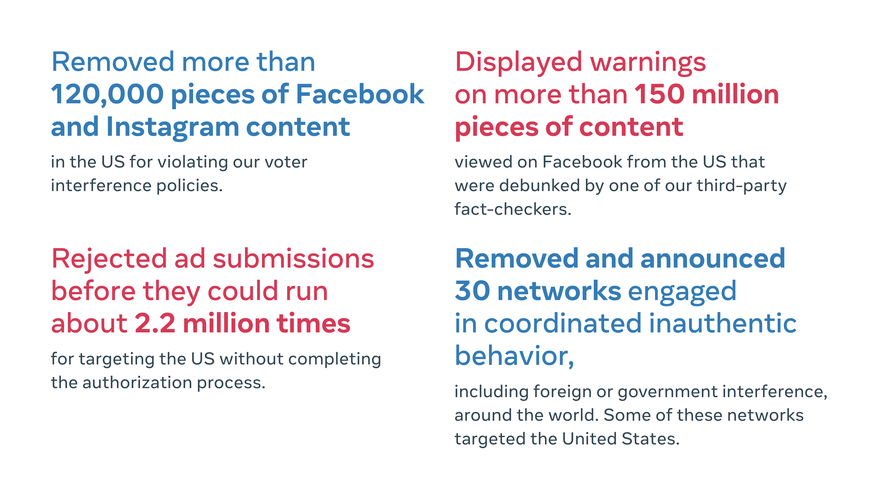
This is in addition to our ongoing efforts, including:
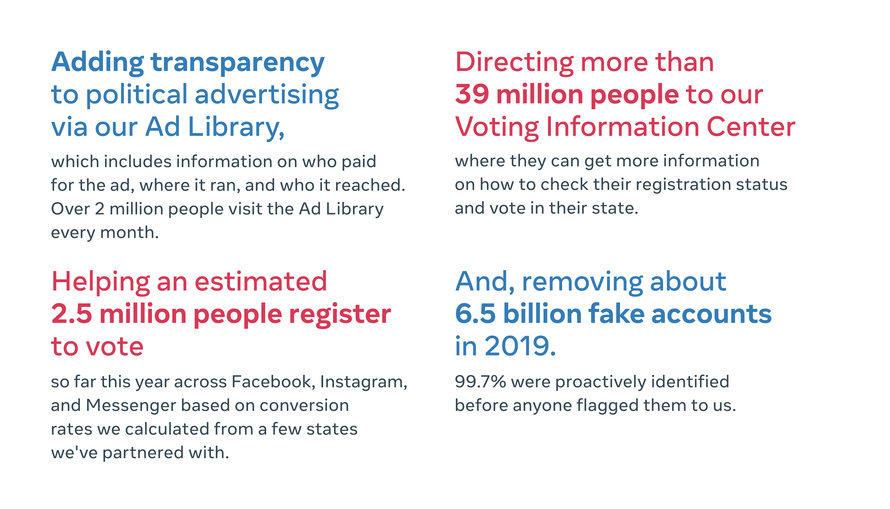
Despite this progress, we’re not taking our eye off the ball. Here are some of the ways that we’ll be working to protect the integrity of this election over these next critical weeks and making sure people have the latest authoritative information about the results.
Activating Our Elections Operations Center
In 2018, we launched our Elections Operations Center ahead of the US midterm elections. Since then, we’ve run it for major elections in Brazil, India, Europe and many other parts of the world. Through it, we bring together subject matter experts from across the company – including from our threat intelligence, data science, engineering, research, operations and legal teams – for real-time monitoring so that we can address potential abuse flowing across our network.
At the onset of the COVID-19 pandemic, we transitioned our work to a virtual space, and that remote Elections Operations Center has run for every caucus, primary, party convention and presidential debate to date, including ahead of tonight’s Vice Presidential debate, and will continue to run through the election. To prioritize our work around the threats we are seeing, our team works in pods to identify and stop suspicious activity. This includes watching for threats in the form of organic content and issue ads, proactively detecting violating content including voter suppression, and investigating attempts of foreign and domestic interference.
Since 2016, we’ve built an advanced system combining people and technology to review the billions of pieces of content that are posted to our platform every day. State-of-the-art AI systems flag content that may violate our policies, users report content to us they believe is questionable and our own teams review content.
We’ve also been building a parallel viral content review system to flag posts that may be going viral – no matter what type of content it is – as an additional safety net. This helps us catch content that our traditional systems may not pick up. We have used this tool throughout this election, and in countries around the world, to detect and review Facebook and Instagram posts that are likely to go viral and take action if that content violates our policies.
In addition, our teams are using other targeted tools to further pinpoint potentially abusive content and address emerging issues on our platform, including our Crisis Assessment Dashboard (CAD). CAD can – for example – allow us to correlate spikes in hate speech or voter interference content happening in Pages or Groups in near real-time across all 50 states. We have alerts for these spikes in signals, which route to operational teams who review the content for risk trends or potential violations, and remove it if we determine it violates our rules.
Planning for Election Results
Getting the final election results this year may take longer than previous elections due to the pandemic and more people voting by mail. So we’re preparing a range of policies and products to keep people informed and prevent the spread of misinformation.
For example, when polls close, we will run a notification at the top of Facebook and Instagram and apply labels to candidates’ posts directing people to the Voting Information Center for more information about the vote-counting process. But, if a candidate or party declares premature victory before a race is called by major media outlets, we will add more specific information in the notifications that counting is still in progress and no winner has been determined.
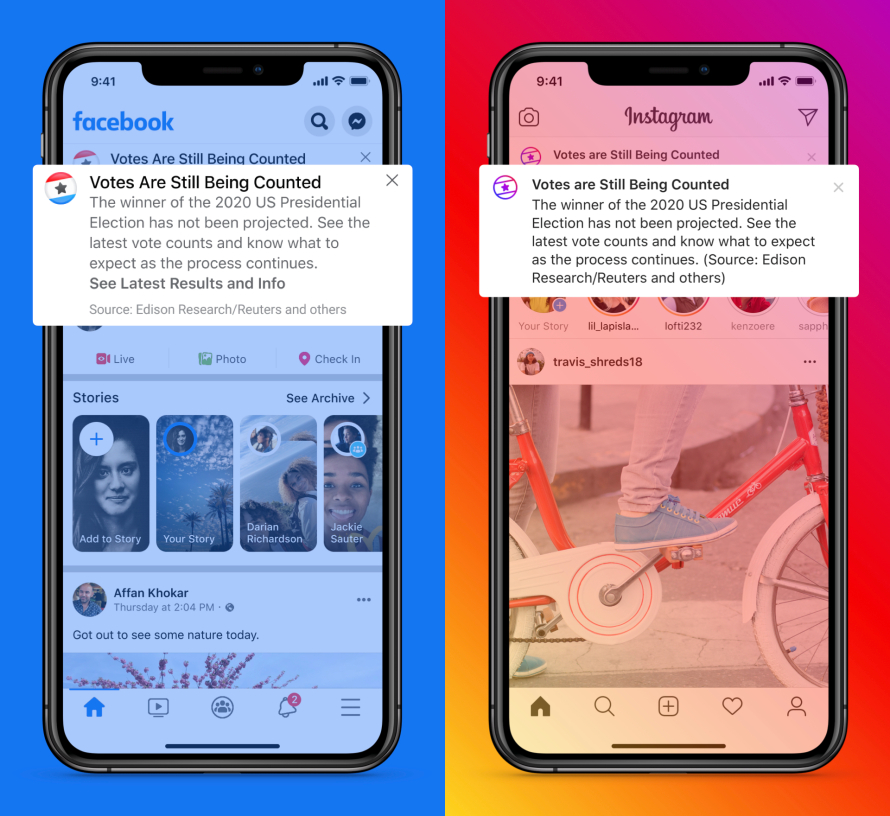
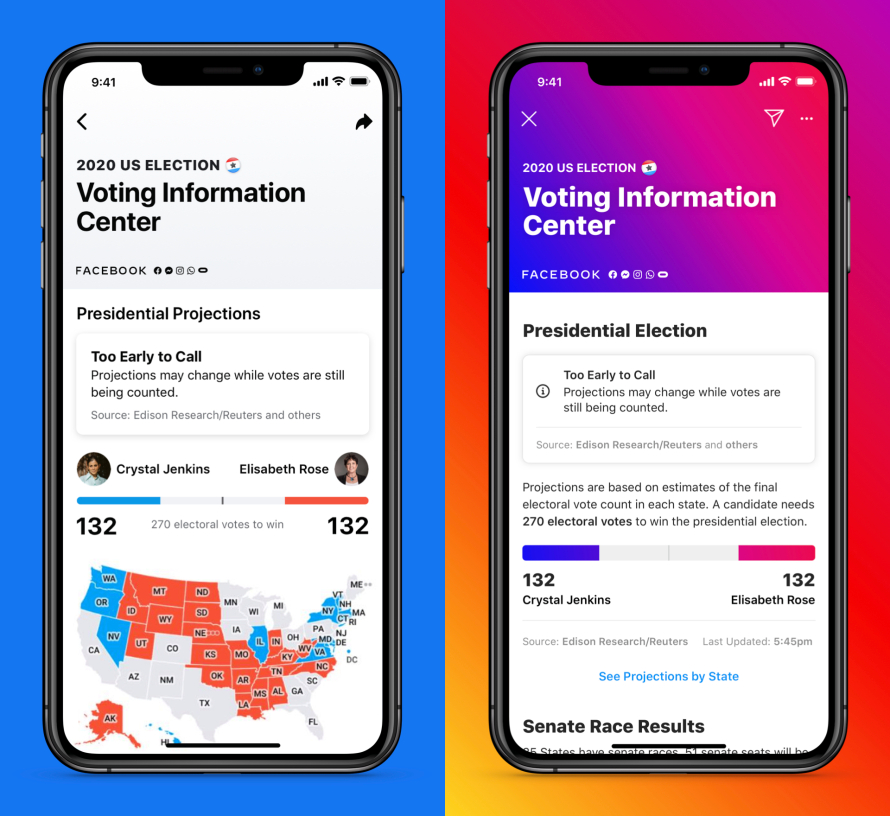
Note: Content and design might change as we refine the products before launch.
If the candidate that is declared the winner by major media outlets is contested by another candidate or party, we will show the name of the declared winning candidate with notifications at the top of Facebook and Instagram, as well as label posts from presidential candidates, with the declared winner’s name and a link to the Voting Information Center.
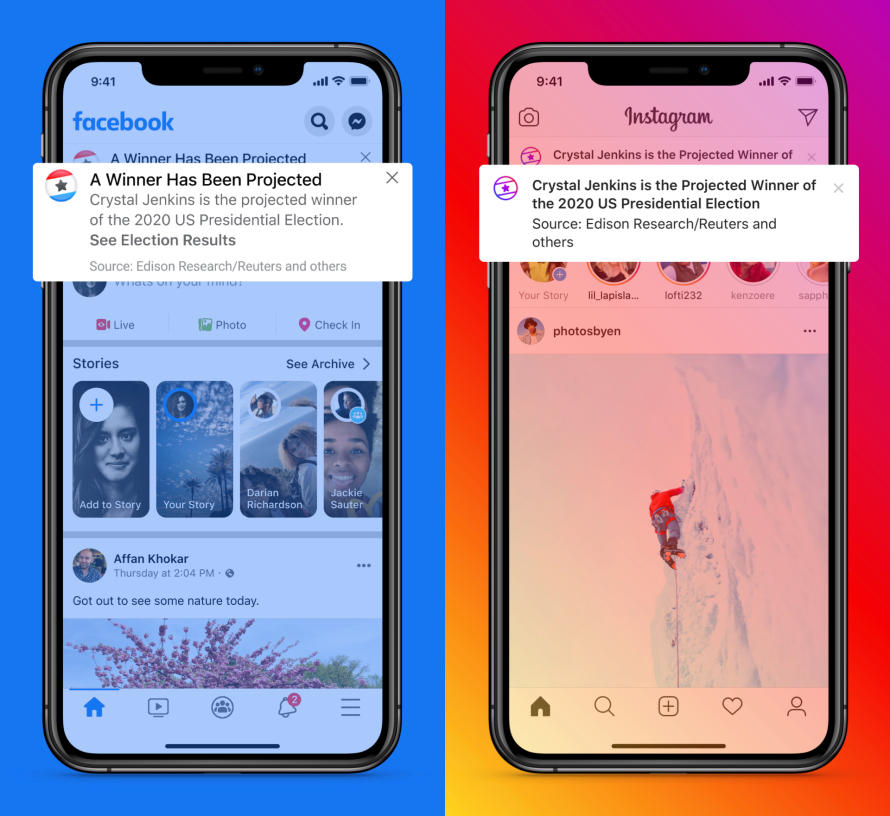
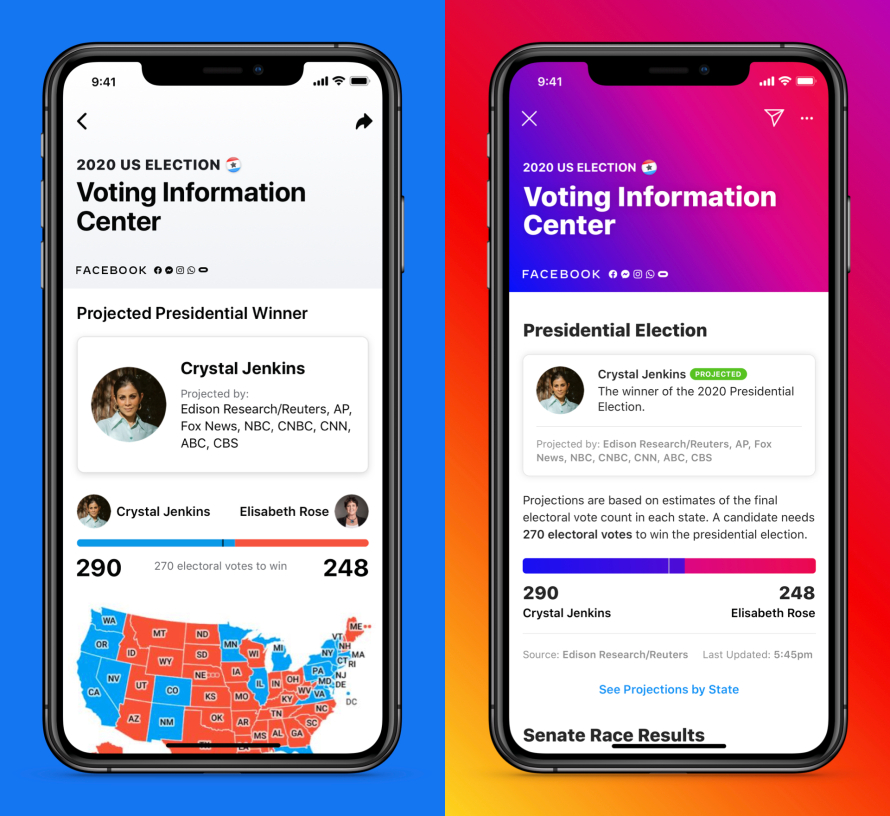
Note: Content and design might change as we refine the products before launch.
And, as we noted earlier this month, we are attaching an informational label to content that discusses issues of legitimacy of the election or claims that lawful methods of voting like mail-in ballots will lead to fraud. This label provides reliable information about the integrity of the election and voting methods. We will help people understand the process with notifications at the top of the Facebook and Instagram apps, through Facts About Voting from the Bipartisan Policy Center, and curated news in people’s News Feed and the Voting Information Center.
In addition, while ads are an important way to express voice, we plan to temporarily stop running all social issue, electoral or political ads in the US after the polls close on November 3, to reduce opportunities for confusion or abuse. We will notify advertisers when this policy is lifted.
Banning Additional Content that Seeks to Intimidate Voters
In addition to the steps that we already take to remove calls for coordinated interference at or bringing weapons to polling places, when we become aware of them, we will also remove calls for people to engage in poll watching when those calls use militarized language or suggest that the goal is to intimidate, exert control, or display power over election officials or voters. We thank the civil rights experts and community members who continue to help us understand trends in this area and we look forward to continuing to work with them.
Working with Federal and State Law Enforcement and Election Authorities to Fight Voter Interference
We also continue to coordinate with state attorneys general and other federal, state, and local law enforcement officials responsible for election protection. When they identify potential voter interference, we investigate and take action if warranted, and have established strong channels of communication to respond to any election-related threats. These efforts are part of our ongoing coordination with law enforcement and election authorities at all levels to protect the integrity of the election.
Last year, we launched Facebook Protect to offer security tools and additional protections to safeguard the Facebook and Instagram accounts of campaigns, elected officials, federal and state political party committees and staff. This has been helping to stop the hack-and-leak operations we saw in 2016. With just under a month until Election Day, we’re encouraging more people to enroll in Facebook Protect by running a notification at the top of Facebook this week to Page admins for government officials, campaigns, political parties and others.
Learn more about our efforts to help protect elections.
https://www.facebook.com/gpa/blog/ad-restriction-update
GPA FACEBOOK for Government, Politics and Advocacy
·
October 29 2020
US: An Update on Some Technical Issues Impacting Political and Issue Ads
Update Nov 1, 2:00PM PT: While we have been able to resolve other problems affecting ads about social issues, elections, and politics during the restriction period for many advertisers, we have not been able to fully address issues affecting ads that use placement asset customization and/or other dynamic creative mechanisms. We do not expect to be able to resolve the technical issues affecting those ad types during the restriction period. We're informing the small group of advertisers affected by this so they can reallocate budget and impressions to other ad types should they wish to do so.Update Oct 30, 10:30PM PT: As we shared earlier, we know that some advertisers are experiencing issues with the import/export feature in Ads Manager.
In Ads Manager, you can bulk import ads by uploading an Excel spreadsheet with campaign, ad set and ad information, or you can export ad and campaign information, so that you can edit your ads directly in Excel. We recently experienced an issue that may have prevented some advertisers from using the import/export feature in Ads Manager. We have now developed a solution that will allow advertisers to continue using the import/export functionality.
When exporting data you will need to follow these slightly modified steps:
- Select the ad object(s) you want to export
- Click on the "Export & Import" dropdown
- Choose "Customize Export" > "Customize Columns"
- In the popup, click on the "Ad Set" option on the left hand column, and click on the checkbox next to "Ad Set" on the list of columns to select all Ad Set columns
- Repeat step 4 for "Campaign". Make sure to leave the “Ad” columns unchecked
- Click "Apply" to finish Export
When importing data, you can follow the steps in our Help Center. You can also watch this short video that walks you through both the export and import steps:
Play
-0:59
Additional Visual SettingsHD
Enter Fullscreen Unmute
And as always, you can reach out to your Facebook account manager for help, or reach us here.
Update Oct 30, 6:35PM PT: We know that some advertisers are experiencing issues with the import/export feature in Ads Manager.
We're actively working to resolve this and expect to have a solution that will launch tonight, October 30 (Pacific Time). This will allow advertisers to import/export ads and other campaign data. It may require some small changes to the way advertisers export this information from Ads Manager (we will be sharing further documentation here when it is live). This solution will continue to support changes like edits to budget amounts.
Original Post from October 29:
As part of our efforts to ensure maximum transparency of political advertising, we began restricting new political and issue ads ahead of next week’s election. We took this step so all political ads would be searchable in our public ad library in advance of Election Day. Our restriction took effect at 12:01 AM PT on October 27th.
Even though the majority of political and issue ads have been unaffected, since the restriction took effect, we have identified a number of unanticipated issues affecting campaigns of both political parties. Some were technical problems. Others were because advertisers did not understand the instructions we provided about when and how to make changes to ad targeting. We have implemented changes to fix these issues, and most political ads are now running without any problems. We are continuing to monitor closely to make sure all of our fixes work and ads are running as intended well in advance of the election.
Here’s what happened. After the restriction went into effect on October 27 at 12:01am PT, technical flaws in our systems’ ability to detect that an ad has been properly recorded in the Ad Library caused a number of ads from a wide range of advertisers to be paused improperly, and prevented advertisers from making permissible changes to their ads. While this impacted a small proportion of the ads about politics and social issues in our system, we regret any disruption in the delivery of these ads during this period. In the course of investigating these technical issues, we also discovered that a number of ads were paused because advertisers had made changes to the targeting shortly before the deadline, which had created new ads that needed to go through approval and delivery before the deadline passed. In speaking with advertisers and reviewing our instructions to them, we realized that we could have been clearer that while advertisers would be able to edit targeting during the restricted period, any edits to targeting before the restricted period would need to be made with ample time to allow the ad to go through our ad review process again. And because these advertisers did ensure that the creative in their ads was publicly accessible prior to the deadline, we have made updates to enable these ads to run. We are also working with advertisers to understand and address any still-outstanding concerns to make sure that ads delivered before the restriction period can continue running.
Here’s what did not happen. No ad was paused or rejected by a person, or because of any partisan consideration. The technical problems were automated and impacted ads from across the political spectrum and both Presidential campaigns. Likewise, with respect to our communication about how to make targeting changes, we provided the same instructions to everyone, and found advertisers across the political spectrum and both Presidential campaigns were confused by our guidance and had ads paused as a result. We have worked throughout this election to maintain a neutral playing field and that remains true in the face of these problems.
We understand that time is of the essence at this stage of the campaign season. Most of the issues have been fully addressed but for any advertisers still facing issues, there are several steps they can take to help their ads reach people. They can also pause ads and resume them as long as those ads delivered an impression before the restriction took effect.
Our teams are 100-percent dedicated to resolving any problems that may come up as quickly as possible. If they do, we will communicate more frequently about the steps we’re taking to resolve them. And if we discover any additional problems, we will include them here over the coming days.
Priorities USA
October 29, 2020
Statement from Priorities USA on Facebook Admitting Fault with Mistaken Ad Shutoffs
The following statement is from Priorities USA Chairman Guy Cecil:After two days of public and private complaints, Facebook has finally acknowledged that they were wrong in shutting off our ads, but their recalcitrance and failure to prepare cost us two of the final seven days of advertising. Facebook has had years to improve their policies. This last-minute policy rollout and implementation was a choice.
Throughout this process we were misled and strung along in an attempt to shift blame onto us and other organizations, but the facts tell a different story. Many groups large and small were dealing with the same problems created by Facebook’s errors.
It is bad enough that Facebook has spent four years bending over backwards to please Donald Trump and Republicans in Congress. The last two days demonstrate a refusal to act responsibly without public pressure. While we are one of the largest spenders on digital ads in either party, it should not take a public campaign and endless calls to get Facebook to act. This is much harder for the many smaller organizations that are working to combat misinformation and voter suppression that do not have the connections and resources of a large group like ours.
While we are glad to see our ads being turned back on, we call on Facebook to guarantee that no other organizations will have to deal with these issues and to respect their own policies as written. We sincerely hope the next Congress and president look closely at Facebook’s election policy and program implementation as they consider future regulatory decisions.
Priorities USA
November 1, 2020
Days Before the Election, Facebook’s Failure to Effectively Manage Its Political Ads Ban Is a Colossal Affront to Our Democracy
Recent stories have made clear that Facebook completely botched its political ads ban rollout. With nearly 100 million people casting early votes and Election Day two days away, this is a complete calamity. This week, Color Of Change PAC, Priorities USA and other progressive campaigns confirmed that they were unable to run thousands of GOTV ads in battlegrounds despite Facebook saying the “bug” that was blocking them was fixed on Tuesday.Having multi-day “bugs” a week out from Election Day that block candidates and campaigns from getting their ads out to voters is inexcusable, and Facebook’s lack of communication about how things went wrong is beyond disappointing. In an election where the stakes for our communities are life and death, Facebook’s failure to effectively manage its platform is not just a dereliction of duty, but a colossal affront to our democracy.
It did not have to be this way. Facebook had four years to come up with a robust plan of action ahead of this election, and instead they continue to rely on ad hoc, press-driven policy making that no one asked for.
We have issued numerous warnings to Facebook and other tech companies about the prominence of disinformation on social media platforms throughout this entire election. Moreover, we know Black voters are primary targets for misinformation campaigns that skew or ignore verifiable facts. Black voters in our country have been subject to increasingly aggressive campaigns of voter suppression, disenfranchisement, and misinformation on social media and at the ballot box. In fact, the admitted strategies of the Trump campaign and the Republican National Committee in 2016 and again in 2020 are misinformation and disinformation efforts to suppress the Black vote. Facebook’s inaction and insufficient reforms are nothing short of an in-kind donation to the Trump campaign.
Ads countering this disinformation, including those from Priorities USA Action and Color of Change PAC, have been erroneously classified and brought down by platforms that claim to combat users and advertisers sharing lies. While stifling our ability to serve voters accurate information about their voting rights, Facebook is prioritizing the organic disinformation of bad actors that seek to do harm.
Facebook must clarify exactly what went wrong and why they failed to disclose the problems, and provide a detailed analysis of how different campaigns were impacted. The public deserves to know, if through Facebook’s lack of preparedness, the company advantaged one presidential candidate over the other.
See also:
Elena Schneider. "Biden camp slams Facebook as thousands of ads remain blocked in final week. " Politico, Oct. 29, 2020.

